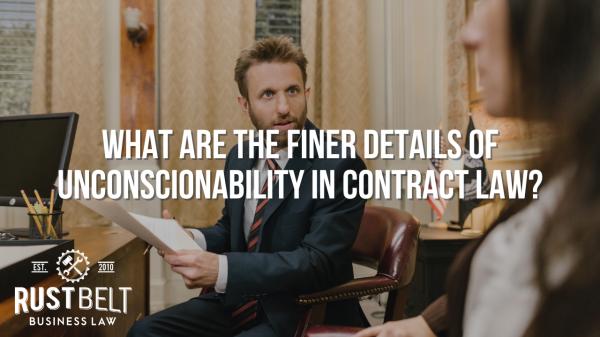Just because a contract appears superficially or facially valid doesn't mean it will always stand up to scrutiny. The inverse is also true: in some cases, a contract that is superficially invalid can still provide a basis for recovery (i.e., cases in which "promissory estoppel" applies).
The Doctrine of Unconscionability
The doctrine of unconscionability is a legal principle that allows courts to invalidate contracts that are so unfair or one-sided that they are considered to be against public policy. The doctrine is based on the idea that parties to a contract should have equal bargaining power and that contracts that are unfairly one-sided can exploit the weaker party.
There are two main types of unconscionability: procedural unconscionability and substantive unconscionability. Procedural unconscionability refers to the way in which a contract was formed, such as if one party was under duress or had no real choice but to agree to the contract. Substantive unconscionability refers to the terms of the contract itself, such as if the terms are unreasonably harsh or unfair.
The doctrine of unconscionability is applied on a case-by-case basis, and there is no single set of factors that courts will always consider. However, some factors that courts may consider include:
- The bargaining power of the parties
- The fairness of the terms of the contract
- Whether the party challenging the contract had any meaningful choice but to agree to it
- Whether the contract was entered into under duress or coercion
The doctrine of unconscionability is an important tool for protecting consumers and other vulnerable parties from unfair contracts. It can help to ensure that contracts are fair and that both parties have a meaningful opportunity to negotiate the terms of the contract.
Update
The doctrine of unconscionability has evolved over time, and courts are now more likely to find contracts unconscionable than they were in the past. This is due in part to the growing awareness of the ways in which contracts can be used to exploit vulnerable parties.
In recent years, there have been a number of high-profile cases in which courts have found contracts unconscionable. For example, in 2013, a California court found that a contract between a payday lender and a borrower was unconscionable because the terms of the contract were so unfair that they were considered to be "draconian."
The doctrine of unconscionability is an important tool for protecting consumers and other vulnerable parties from unfair contracts. It is a reminder that contracts should be fair and that both parties should have a meaningful opportunity to negotiate the terms of the contract.
Contact Rust Belt Business Law for More Information
If you have any questions about the doctrine of unconscionability or if you believe that a contract you have entered into is unconscionable, you should contact an experienced business law attorney. An attorney can help you to understand your legal rights and options and can represent you in court if necessary.
To learn more about the doctrine of unconscionability or to schedule a consultation with an attorney, please contact Rust Belt Business Law today.




